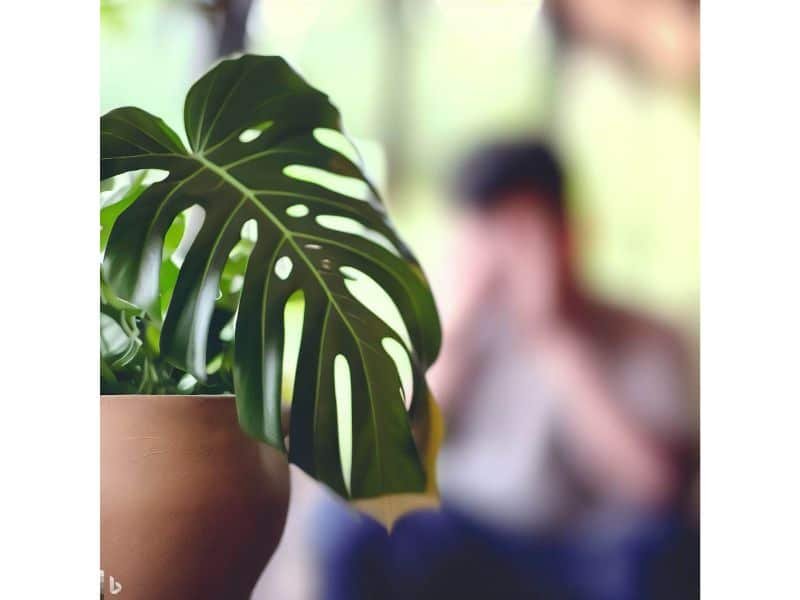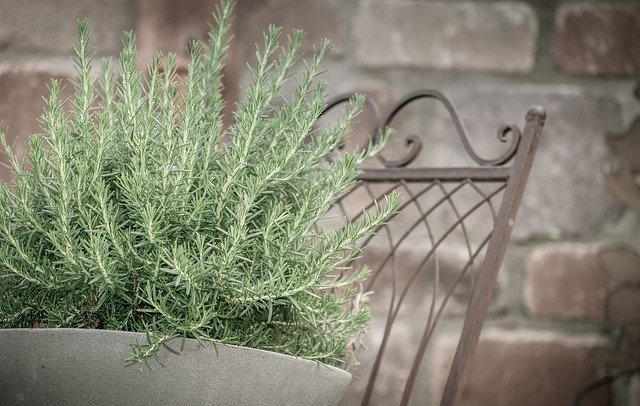Have you ever accidentally touched the clear monstera plant’s sap and suddenly you start itching and your eyes begin to water? If that was the case, you might be wondering: Can Monstera cause allergies? While monstera plants are one of the ultimate charms in the world of tropical plants, some people may have experienced allergic reactions to certain components of the plant. But do monstera plants really not that compatible with allergies?

Table of Contents
Why Is Monstera Plant Poisonous?
First thing first, before we move to the conclusion about whether can monstera cause allergies, we need to investigate what makes this stunning shade-loving houseplant poisonous. The Monstera plant, which is scientifically known as Monstera deliciosa, contains certain chemical compounds that can be considered poisonous called calcium oxalate crystals. These microscopic poisonous compounds can be found in various parts of the plant, including the sap, stems, leaves, and other tissues–taking up nearly 80% of the plant.
The presence of calcium oxalate crystals in monstera plants serves as the plant’s unique way of defense mechanism against herbivores and pests. When a predator attempts to munch the plant’s leaf, for instance, these crystals can cause irritation and discomfort in their mouth. That’s why monstera deliciosa toxicity, fortunately, makes them not that appealing to herbivores like deer and deters the animal from further feeding on them.
Are The Calcium Oxalate Crystals Of Monstera Plant Cause Allergy?
Now let’s jump into the main topic: can monstera cause allergies? Monstera plants, despite being poisonous to both humans and most animals, are not known to be the triggers of allergies. While allergic reactions may occur and cause irritation, especially if they come into contact with the skin, eyes, and mouth, genuine allergic reactions such as the immune system and antibodies reactions are less common. This is because calcium oxalate crystals, in contrast to pollen, are not known for being an allergen.
However, it’s worth noting that individual sensitivities vary, and some people with allergies may have specific sensitivity towards certain parts of the monstera plant. This sensitivity may trigger the symptoms, but it doesn’t solely mean that the monstera plant itself is an allergen.
How Would Your Body React To Monstera Deliciosa Toxicity?

Now that you know the exact answer to ‘Can monstera cause allergies?’, you may be curious about what this plant does to the human body? Well, when you’re exposed to monstera plant poisonous sap, your body may react in numerous ways, depending on factors like age, immune system, and sensitivity. When the sap of Monstera deliciosa touches your skin, you may experience irritation, redness, itchiness, swelling, or even a burning or stinging sensation at the site of the contact.
If the sap gets into your eyes, the toxic compounds can lead to eye irritation, red eye, and watering. Ingesting monstera plant parts, especially the leaves, can cause oral problems such as swelling lips, throat, or tongue, to digestive-related symptoms such as vomiting. In rare cases, monstera deliciosa toxicity may also involve breathing difficulty. These symptoms might be scary, but fortunately, the most common reaction to monstera plant sap poisoning is skin itchiness or irritation.
Who Should Avoid Planting Monstera Plants?
We understand that Monstera deliciosa is the ultimate breathtaking addition to your indoor jungle, but there are a few cases where you should avoid or really keep your attention high when incorporating this plant into your garden. If you have curious toddlers and pets that love to explore and munch, it’s best to exercise precautions and keep Monstera plants away from their reach.
Furthermore, you still can enjoy monstera plants’ beauty and at the same time avoid monstera plant toxicity, by providing an outdoor landscape with all the growing conditions needed. Thankfully, in general, monstera deliciosa is not a demanding plant when it comes to thriving necessities, as long as you keep them away from the hot direct sunlight which the plant hates the most.
If you’re a gardener with already known allergies or sensitivities towards certain allergens or even slight environmental changes, ensure to handle the plant carefully and never go bare-handed. Monstera plant poisonous calcium oxalate crystals can penetrate the skin since they’re microscopic and can’t be seen with bare eyes, so it’s also wise to use a gardening apron and latex gloves for an extra layer of protection.
Does Monstera Have Pollen?
Any expert plant lover knows that monstera is favored for its massive foliage that can be a beautiful combination of green and milky white, but this plant does produce flowers. And yes, the Monstera flowers do have pollen but are relatively low compared to any other flowering plants. Moreover, monstera deliciosa relies more on insect pollination, mostly with the help of Trigona bees, rather than wind pollination.
In regards to pollen, can Monstera cause allergies? The answer is not likely. Pollen allergies are usually triggered by wind-pollinated flowers such as anemones and roses, with lightweight and sheer pollen that can be easily dispersed in the air and inhaled by our respiratory system. But once again, your sensitivity towards the plant may be different from the others, so it’s wise to always conduct a precaution.
Does Monstera Cause Hay Fever?

Monstera deliciosa toxicity might cause unpleasant experiences for some, but this plant is not associated with causing hay fever. Also known as rhinitis allergy, hay fever is triggered by airborne allergens, therefore, it’s highly unlikely that monstera plant can cause hay fever.
Can Monstera cause allergies similar to hay fever? Although the symptoms of hay fever and monstera poisoning might look similar, generally, monstera poisoning is not fatal and might only need simpler treatments than hay fever.
Are Monstera Plants Pet-Friendly?
Monstera plants are definitely toxic for pets, but can Monstera cause allergies in pets?
Similar to humans, calcium oxalate crystals in monstera plants are not known for causing allergies, but still, this can lead to bigger problems for your pets. The calcium oxalate crystals in monstera plants can cause symptoms such as drooling, vomiting, oral irritation, and difficulty in swallowing. Seek veterinary care immediately if you find your cats or dogs accidentally eating the plant for your pet’s well-being.
How Do You Manage The Symptoms Of Monstera Plant Poisoning?
First and foremost, don’t panic! Walk to the nearest bathroom and wash any infected areas thoroughly with mild soap and running water if you get into contact with the plant’s sap. Next, avoid touching your face, especially with dirty hands, or rub your eyes to prevent further infection.
If you accidentally ingested the plant, rinse your mouth with water and drink plenty of water immediately to dilute any remaining toxins. Remember that calcium oxalate crystals are not water-soluble so you need a lot of water to defeat the toxins! Can monstera cause allergies in people with sensitivities? The answer is unlikely, however, if you have extreme sensitivities, the way your body reacts to monstera plants’ calcium oxalate crystals might be more severe than people with no sensitivities.
Sum Up: Can Monstera Cause Allergies?
To wrap things up, monstera deliciosa is not the typical culprit that causes allergies, but they do cause poisoning symptoms such as watery eyes, itchiness, skin rash, and red eyes. It’s safe to still embrace the exotic beauty of monstera with proper care and precaution though, and always be mindful of any potential sensitivities.

New author in the hood. Loves gardening and flowers are my spirit animals (yes I know they are not animals but I insist). I will be covering most of the flowers’ topics here and occasionally random though as well.






